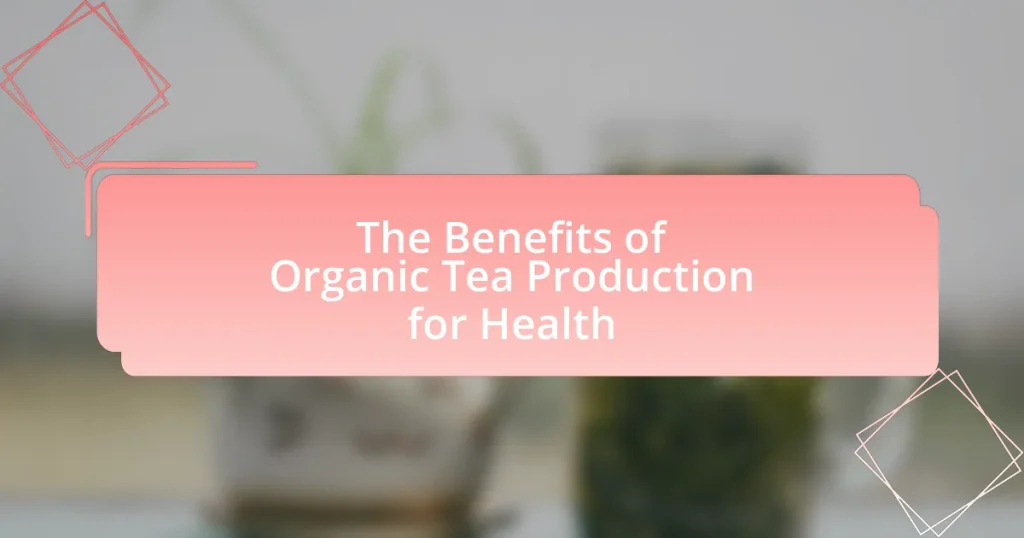Organic tea production is characterized by the absence of synthetic pesticides and fertilizers, leading to numerous health benefits. This cultivation method enhances the nutritional profile of tea, resulting in higher levels of antioxidants, essential minerals, and vitamins, which contribute to improved heart health and immune function. The article explores the differences between organic and conventional tea, the farming practices that enhance tea quality, and the health benefits associated with organic tea consumption, including stress reduction and cardiovascular health. Additionally, it addresses the environmental advantages of organic tea production, challenges faced by producers, and best practices for brewing organic tea to maximize its health benefits.

What are the Benefits of Organic Tea Production for Health?
Organic tea production offers numerous health benefits, primarily due to the absence of synthetic pesticides and fertilizers. This method of cultivation enhances the nutritional profile of tea, resulting in higher levels of antioxidants, such as catechins and flavonoids, which are known to combat oxidative stress and reduce the risk of chronic diseases. Research indicates that organic tea can contain up to 30% more antioxidants compared to conventionally grown tea, contributing to improved heart health and better immune function. Additionally, organic tea is often richer in essential minerals and vitamins, further supporting overall well-being.
How does organic tea differ from conventional tea?
Organic tea differs from conventional tea primarily in its cultivation methods, which prohibit the use of synthetic pesticides, herbicides, and fertilizers. Organic tea is grown using natural farming practices that promote biodiversity and soil health, while conventional tea often relies on chemical inputs that can harm the environment and potentially affect human health. Studies have shown that organic farming can lead to higher antioxidant levels in tea, contributing to better health benefits. For instance, research published in the Journal of Agricultural and Food Chemistry found that organic tea contains significantly higher levels of polyphenols, which are linked to various health benefits, compared to conventional tea.
What farming practices are used in organic tea production?
Organic tea production employs farming practices such as crop rotation, composting, and the use of natural pest control methods. These practices enhance soil fertility, promote biodiversity, and reduce chemical inputs. For instance, crop rotation helps prevent soil depletion and pest buildup, while composting enriches the soil with organic matter, improving plant health. Additionally, natural pest control methods, such as introducing beneficial insects, minimize the reliance on synthetic pesticides, aligning with organic farming standards set by organizations like the USDA.
How do these practices impact the quality of tea?
Organic tea production practices significantly enhance the quality of tea by promoting healthier soil, reducing chemical residues, and improving flavor profiles. These practices, such as using natural fertilizers and pest control methods, lead to a more nutrient-rich environment for tea plants, which in turn results in higher antioxidant levels and better taste. Research indicates that organic teas often contain higher concentrations of beneficial compounds like polyphenols and flavonoids, which contribute to both health benefits and flavor complexity. For instance, a study published in the Journal of Agricultural and Food Chemistry found that organic teas had up to 30% more antioxidants compared to conventionally grown counterparts, validating the positive impact of organic practices on tea quality.
What health benefits are associated with organic tea consumption?
Organic tea consumption offers several health benefits, including improved heart health, enhanced mental alertness, and increased antioxidant intake. Studies indicate that organic tea contains higher levels of polyphenols, which are compounds known to reduce the risk of cardiovascular diseases by improving blood vessel function and lowering cholesterol levels. Additionally, organic tea is often free from synthetic pesticides and fertilizers, which can lead to a cleaner product that supports overall well-being. Research published in the Journal of Nutrition highlights that the antioxidants found in organic tea, such as catechins, can help combat oxidative stress and inflammation, further contributing to better health outcomes.
How do antioxidants in organic tea contribute to health?
Antioxidants in organic tea contribute to health by neutralizing free radicals, which can cause cellular damage and lead to chronic diseases. These antioxidants, primarily polyphenols such as catechins and flavonoids, have been shown to reduce inflammation, lower the risk of heart disease, and improve overall immune function. Research indicates that regular consumption of tea rich in these compounds can enhance cardiovascular health; for instance, a study published in the American Journal of Clinical Nutrition found that individuals who consumed green tea regularly had a significantly lower risk of developing heart disease compared to non-consumers.
What role does organic tea play in reducing stress and anxiety?
Organic tea plays a significant role in reducing stress and anxiety due to its natural compounds, particularly L-theanine, which promotes relaxation without sedation. Studies have shown that L-theanine can increase alpha brain wave activity, leading to a state of calmness and improved focus. Additionally, organic teas, such as chamomile and lavender, contain antioxidants and anti-inflammatory properties that contribute to overall mental well-being. Research published in the Journal of Clinical Psychopharmacology indicates that regular consumption of herbal teas can lower cortisol levels, a hormone associated with stress. Thus, organic tea serves as a beneficial tool for managing stress and anxiety effectively.
Why is organic tea considered better for the environment?
Organic tea is considered better for the environment because its cultivation avoids synthetic pesticides and fertilizers, which can harm ecosystems and biodiversity. This method promotes healthier soil and water systems, as organic farming practices enhance soil fertility and reduce water pollution. According to the USDA, organic farming can lead to a 30% increase in biodiversity compared to conventional farming, supporting a wider range of plant and animal life. Additionally, organic tea production often employs sustainable practices such as crop rotation and composting, further minimizing environmental impact and promoting ecological balance.
How does organic tea production affect soil health?
Organic tea production enhances soil health by promoting biodiversity and improving soil structure. The use of organic farming practices, such as crop rotation and the application of organic fertilizers, increases microbial activity and nutrient availability in the soil. Research indicates that organic farming can lead to higher levels of soil organic matter, which is crucial for maintaining soil fertility and water retention. A study published in the journal “Agriculture, Ecosystems & Environment” found that organic tea farms had significantly higher soil organic carbon levels compared to conventional farms, demonstrating the positive impact of organic practices on soil health.
What are the implications of organic farming on biodiversity?
Organic farming positively impacts biodiversity by promoting a diverse ecosystem through the use of natural farming practices. This approach reduces chemical inputs, which can harm non-target species, and encourages the presence of beneficial organisms such as pollinators and soil microbes. Studies indicate that organic farms typically host higher species richness and abundance compared to conventional farms, with research showing that organic farming can increase species diversity by up to 30%. Additionally, organic practices such as crop rotation and intercropping enhance habitat complexity, further supporting a variety of wildlife.
How can consumers identify high-quality organic tea?
Consumers can identify high-quality organic tea by looking for certifications, examining the packaging, and assessing the aroma and flavor. Certifications such as USDA Organic or equivalent ensure that the tea is grown without synthetic pesticides or fertilizers. High-quality organic tea often comes in packaging that protects it from light and moisture, indicating care in preservation. Additionally, consumers should evaluate the aroma and flavor; premium organic teas typically have a rich, complex scent and a balanced taste, reflecting the quality of the leaves and the growing conditions.
What certifications should consumers look for in organic tea?
Consumers should look for certifications such as USDA Organic, EU Organic, and JAS (Japanese Agricultural Standards) when purchasing organic tea. These certifications ensure that the tea has been produced without synthetic pesticides, herbicides, or genetically modified organisms, adhering to strict organic farming standards. The USDA Organic certification, for example, requires that at least 95% of the ingredients are organic, while the EU Organic certification has similar requirements, ensuring consumer safety and environmental sustainability.
How can packaging influence the quality of organic tea?
Packaging can significantly influence the quality of organic tea by protecting it from environmental factors that can degrade its flavor and potency. Proper packaging materials, such as opaque, airtight containers, prevent exposure to light, moisture, and air, which can lead to oxidation and loss of essential oils and antioxidants in the tea. Research indicates that tea stored in high-quality packaging retains its freshness and beneficial compounds for a longer duration, thereby enhancing its overall quality and health benefits. For instance, a study published in the Journal of Food Science found that tea stored in vacuum-sealed bags maintained higher levels of catechins, a type of antioxidant, compared to those stored in non-airtight packaging.
What are the potential drawbacks of organic tea production?
The potential drawbacks of organic tea production include higher costs, lower yields, and increased vulnerability to pests and diseases. Organic tea farming often requires more labor and resources, leading to elevated production costs compared to conventional methods. For instance, a study published in the Journal of Agricultural Economics found that organic tea yields can be 20-30% lower than those of conventional tea due to stricter regulations on pesticide use. Additionally, organic tea plants may be more susceptible to pests and diseases, which can further impact overall production and quality.
How does the cost of organic tea compare to conventional tea?
Organic tea generally costs more than conventional tea due to higher production standards and certification processes. The average price difference can range from 20% to 100% more for organic varieties, reflecting the costs associated with organic farming practices, which often include more labor-intensive methods and lower yields. For instance, a study published in the Journal of Agricultural and Resource Economics found that organic tea prices are significantly influenced by the costs of organic certification and sustainable farming practices, leading to higher retail prices compared to conventional tea.
What challenges do organic tea producers face?
Organic tea producers face several significant challenges, including pest management, certification costs, and market competition. Pest management is particularly difficult because organic producers cannot use synthetic pesticides, leading to potential crop losses. Certification costs can be prohibitive, as obtaining and maintaining organic certification requires compliance with strict regulations and ongoing expenses. Additionally, market competition from conventional tea producers, who often sell at lower prices due to reduced production costs, poses a challenge for organic tea producers trying to establish a foothold in the market. These factors collectively hinder the growth and sustainability of organic tea production.
What are the best practices for brewing organic tea?
The best practices for brewing organic tea include using fresh, filtered water, the correct water temperature, and appropriate steeping time. Fresh, filtered water enhances the flavor and quality of the tea, while the ideal water temperature varies by tea type: green tea typically requires water at 160-180°F, black tea at 200-212°F, and herbal tea at boiling point. Steeping times also differ; for example, green tea should steep for 2-3 minutes, black tea for 3-5 minutes, and herbal tea for 5-7 minutes. Following these guidelines ensures optimal extraction of flavors and beneficial compounds, maximizing the health benefits associated with organic tea consumption.
How does water temperature affect the flavor of organic tea?
Water temperature significantly affects the flavor of organic tea by influencing the extraction of compounds from the tea leaves. Higher temperatures, typically around 90-100°C, extract more tannins and caffeine, resulting in a stronger, more astringent flavor, while lower temperatures, around 70-80°C, yield a smoother, more delicate taste with enhanced floral and fruity notes. Research indicates that different types of tea, such as green, black, and oolong, require specific temperature ranges for optimal flavor extraction, with green tea generally benefiting from lower temperatures to avoid bitterness. This relationship between water temperature and flavor is crucial for achieving the desired taste profile in organic tea, as confirmed by studies on tea brewing techniques.
What steeping times are recommended for different types of organic tea?
Recommended steeping times for different types of organic tea vary: green tea should steep for 2-3 minutes, black tea for 3-5 minutes, oolong tea for 4-7 minutes, white tea for 4-5 minutes, and herbal tea for 5-7 minutes. These times ensure optimal flavor extraction and preserve the beneficial compounds present in the tea. For instance, steeping green tea for too long can lead to bitterness, while under-steeping may result in a weak flavor.


